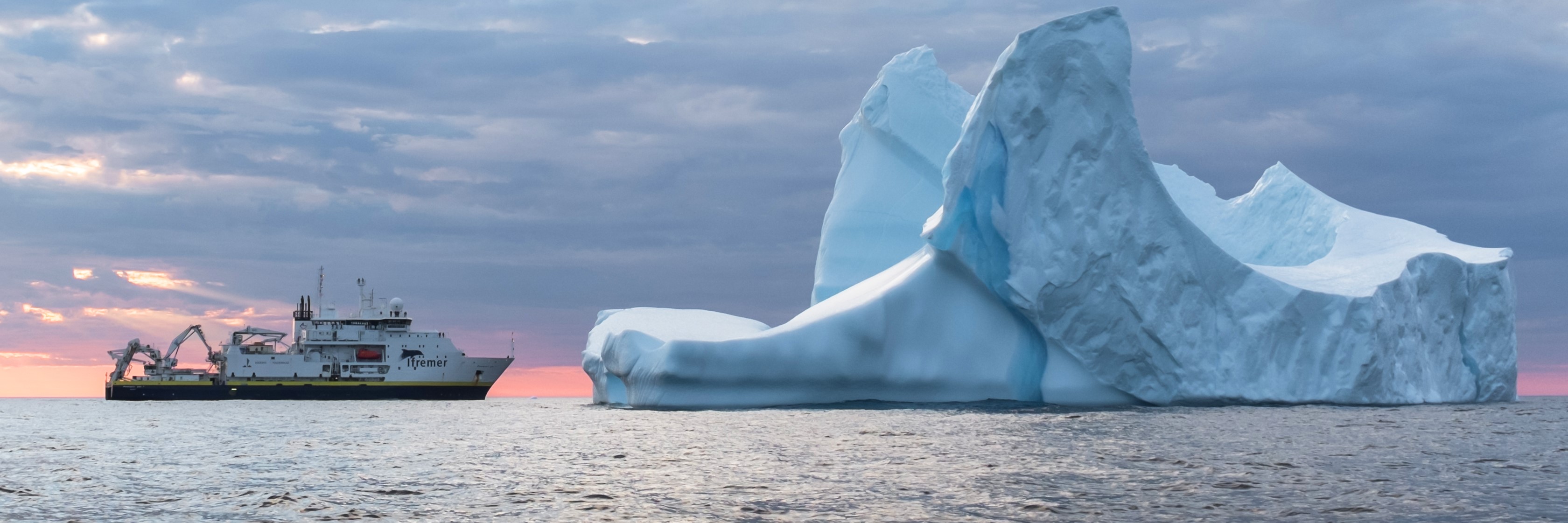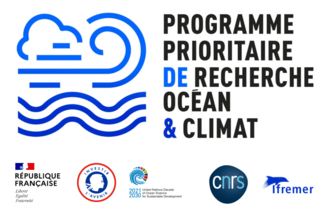France Priority Research Program - Ocean and Climate: an ocean of solutions
IFREMER – Institut français de recherche pour l’exploitation de la mer, and CNRS – Centre national de la recherche scientifique (scientific community)
(
Scientific community
)
#OceanAction46089
Description
The French Priority Research Programme “Ocean & Climate: an ocean of solutions” is a 6 years scientific program supporting transformative, integrative, bold and forward-looking marine science. The Programme targets societal and strategic issues facing vulnerable marine coastal areas and the deep ocean, including polar oceans and overseas islands. It intends to engage the French ocean scientific community at large, along local and regional stakeholders and together with civil society, in order to better understand and anticipate the changes in the ocean, to propose science-based solutions for the sustainable management of marine resources, and to inform decision-makers.
The program addresses 7 challenges :
1. Predict and anticipate the impacts of extreme phenomena linked to climate change
2. Polar oceans: little-known, rapidly changing ecosystems with coveted resources
3. Resilience of marine environments: analyze actions taken and develop innovative management approaches
4. Contribute to a blue sustainable economy by developing adapted modes of governance
5. Characterize and quantify, using integrated approaches, anthropogenic stresses and their effects on marine ecosystems, to define appropriate thresholds and regulations
6. Develop innovative, multidisciplinary, multi-parameter, multi-scale and multi-actor observation and modeling platforms
7. Share scientific discovery and marine issues with citizens through participatory science and an open science approach
Regular calls for projects are launched, under the guidance of a dedicated scientific committee. The relevant projects are selected and funded based on their ability to meet one are several of the above challenges. A national steering committee (Central administrations, National Research Agency, CNRS, IFREMER) monitors the general strategy, finances and progress of the Programme.
The 40 million Euros “Ocean & Climate: an ocean of solutions” Priority Research Programme is funded by the French Government under the “Investment for the Future” plan. It is a clear sign of France's commitment to the success of the United Nations Decade of Ocean Sciences for Sustainable Development, and is endorsed as an Ocean Decade contribution.
Calls for projects are launched and reviewed under the guidance of a dedicated scientific committee.
A national steering committee (Central administrations, National Research Agency, CNRS, IFREMER) monitors the general strategy, finances and progress of the Programme.
IFREMER – Institut français de recherche pour l’exploitation de la mer (scientific community) CNRS – Centre national de la recherche scientifique (scientific community)
SDGS & Targets
Goal 13
Take urgent action to combat climate change and its impacts
13.1
Strengthen resilience and adaptive capacity to climate-related hazards and natural disasters in all countries
13.1.1
Number of deaths, missing persons and directly affected persons attributed to disasters per 100,000 population
13.1.2
Number of countries that adopt and implement national disaster risk reduction strategies in line with the Sendai Framework for Disaster Risk Reduction 2015–2030
13.1.3
Proportion of local governments that adopt and implement local disaster risk reduction strategies in line with national disaster risk reduction strategies
13.2
Integrate climate change measures into national policies, strategies and planning
13.2.1
Number of countries with nationally determined contributions, long-term strategies, national adaptation plans and adaptation communications, as reported to the secretariat of the United Nations Framework Convention on Climate Change
13.2.2
Total greenhouse gas emissions per year
13.3
Improve education, awareness-raising and human and institutional capacity on climate change mitigation, adaptation, impact reduction and early warning
13.3.1
Extent to which (i) global citizenship education and (ii) education for sustainable development are mainstreamed in (a) national education policies; (b) curricula; (c) teacher education; and (d) student assessment
13.a
Implement the commitment undertaken by developed-country parties to the United Nations Framework Convention on Climate Change to a goal of mobilizing jointly $100 billion annually by 2020 from all sources to address the needs of developing countries in the context of meaningful mitigation actions and transparency on implementation and fully operationalize the Green Climate Fund through its capitalization as soon as possible
13.a.1
Amounts provided and mobilized in United States dollars per year in relation to the continued existing collective mobilization goal of the $100 billion commitment through to 2025
13.b
Promote mechanisms for raising capacity for effective climate change-related planning and management in least developed countries and small island developing States, including focusing on women, youth and local and marginalized communities
13.b.1
Number of least developed countries and small island developing States with nationally determined contributions, long-term strategies, national adaptation plans and adaptation communications, as reported to the secretariat of the United Nations Framework Convention on Climate Change
Goal 14
Conserve and sustainably use the oceans, seas and marine resources for sustainable development
14.1
By 2025, prevent and significantly reduce marine pollution of all kinds, in particular from land-based activities, including marine debris and nutrient pollution
14.1.1
(a) Index of coastal eutrophication; and (b) plastic debris density
14.2
By 2020, sustainably manage and protect marine and coastal ecosystems to avoid significant adverse impacts, including by strengthening their resilience, and take action for their restoration in order to achieve healthy and productive oceans
14.2.1
Number of countries using ecosystem-based approaches to managing marine areas
14.3
Minimize and address the impacts of ocean acidification, including through enhanced scientific cooperation at all levels
14.3.1
14.4
By 2020, effectively regulate harvesting and end overfishing, illegal, unreported and unregulated fishing and destructive fishing practices and implement science-based management plans, in order to restore fish stocks in the shortest time feasible, at least to levels that can produce maximum sustainable yield as determined by their biological characteristics
14.4.1
14.5
By 2020, conserve at least 10 per cent of coastal and marine areas, consistent with national and international law and based on the best available scientific information
14.5.1
14.6
By 2020, prohibit certain forms of fisheries subsidies which contribute to overcapacity and overfishing, eliminate subsidies that contribute to illegal, unreported and unregulated fishing and refrain from introducing new such subsidies, recognizing that appropriate and effective special and differential treatment for developing and least developed countries should be an integral part of the World Trade Organization fisheries subsidies negotiation
14.6.1
Degree of implementation of international instruments aiming to combat illegal, unreported and unregulated fishing
14.7
By 2030, increase the economic benefits to Small Island developing States and least developed countries from the sustainable use of marine resources, including through sustainable management of fisheries, aquaculture and tourism
14.7.1
Sustainable fisheries as a proportion of GDP in small island developing States, least developed countries and all countries
14.a
Increase scientific knowledge, develop research capacity and transfer marine technology, taking into account the Intergovernmental Oceanographic Commission Criteria and Guidelines on the Transfer of Marine Technology, in order to improve ocean health and to enhance the contribution of marine biodiversity to the development of developing countries, in particular small island developing States and least developed countries
14.a.1
14.b
Provide access for small-scale artisanal fishers to marine resources and markets
14.b.1
Degree of application of a legal/regulatory/policy/institutional framework which recognizes and protects access rights for small‐scale fisheries
14.c
Enhance the conservation and sustainable use of oceans and their resources by implementing international law as reflected in United Nations Convention on the Law of the Sea, which provides the legal framework for the conservation and sustainable use of oceans and their resources, as recalled in paragraph 158 of "The future we want"
14.c.1
Number of countries making progress in ratifying, accepting and implementing through legal, policy and institutional frameworks, ocean-related instruments that implement international law, as reflected in the United Nations Convention on the Law of the Sea, for the conservation and sustainable use of the oceans and their resources
SDG 14 targets covered
| Name | Description |
|---|---|
| 14.a | Increase scientific knowledge, develop research capacity and transfer marine technology, taking into account the Intergovernmental Oceanographic Commission Criteria and Guidelines on the Transfer of Marine Technology, in order to improve ocean health and to enhance the contribution of marine biodiversity to the development of developing countries, in particular small island developing States and least developed countries |
Deliverables & Timeline
First call for projects
First call for PhD candidates
Second call for projects
Second call for PhD candidates
Resources mobilized
Partnership Progress


Feedback
Action Network

Timeline
Entity
Other beneficiaries
Research organisations and Universities based in France, including French overseas territories (La Réunion, Martinique, Guadeloupe, Guyane, Nouvelle-Calédonie, Tahiti, Saint Pierre et Miquelon)
Ocean Basins
Communities of Ocean Action
Photos

More information
Countries

Headquarters
Contact Information
Emmanuelle Platzgummer, Ms

